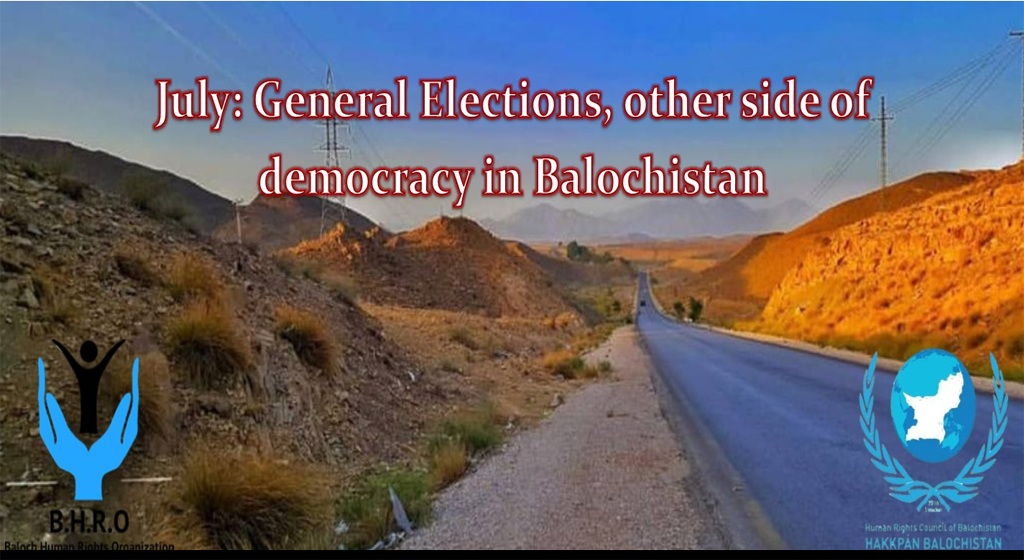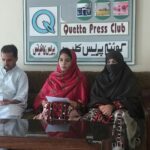Fifty-eight people were forcibly disappeared and 209 were killed in Balochistan in July 2018, the month when general elections were held in Pakistan.
Pakistan’s southwestern region, Balochistan, remained a battleground during the election month, as armed nationalist groups and the military locked horns to influence the voting process. The nationalists campaigned to boycott the elections and conducted several attacks on election-related activities.
The military, on the other hand, used its power to make the electoral process successful as well as influence the election results. We received countless credible reports from Balochistan indicating polls were rigged in different districts of to bring the army´s favorite candidates into the parliament.
Conflict Background:
Decades-old conflict between nationalists and the Islamabad government went violent when the military assumed power in Pakistan in 1999 under General Parvez Musharraf’s command.
Baloch nationalists blame the central government and the military for denying the indigenous people the right to development and their due share in natural resources extracted from Balochistan like natural gas, gold etc. Natural gas, discovered in Sui in 1950s, plays an important role in Pakistan’s economy while most areas of Balochistan remain deprived of it till this day.
Election Boycott:
Separatist Baloch nationalists, under the leadership of the late Nawab Khair Bakhsh Marri, have always campaigned against the Baloch participation in Pakistan’s parliamentary system, as they believed such participation would validate Pakistan’s “occupation” of Balochistan.
The election boycott trend was further revived by Ghulam Mohammad Baloch, who was assassinated in 2009 by the military, and Dr Allah Nezar, the purported commander in chief of Balochistan Liberation Front, the most active Baloch insurgent group.
After the assassination of Akbar Khan Bugti in 2006, even those Baloch political parties which had been traditionally participating in the elections and had expected some sort of democratic change through the parliament decided to quit parliament in protest. Parliamentarians affiliated with Akhtar Mengal-led Balochistan National Party, resigned from the provincial and central parliament after Bugti’s killing.
Situation:
We received confirmed reports from different districts (including Kech, Awaran, Kharan) of Baloch insurgents attacking election-related activities.
On 6 July, the election office of General retired Abdul Qadir Baloch was attacked in Kharan area of Balochistan. The attack was claimed by Baloch Liberation Army (BLA).
On 11 July, a public gathering of Pakistan Tehrik-e-Insaf (PTI) was attacked by Balochistan Liberation Front(BLF) in the Hub city of Balochistan.
On 12 July, the election office of Balochistan Awami Party (BAP) was attacked in Khuzdar area of Balochistan. Two persons were injured in the grenade attack.
On 21 July, a candidate for PB 44 Balochistan Assembly, Mehrulla, was attacked in the Mashkay region of district Awaran. BLF claimed responsibility for the attack.
On 23 July, around 30 persons were injured in a blast which targetted election office of BAP in Dalbandin Balochistan. No group claimed responsibility.
More than a hundred attacks on the military were reported during the month. Armed groups attacked military convoys patrolling for the security of the election offices and poling areas.
On the other hand, the government stopped the supply of drinking water, electricity and internet in most districts of Balochistan.
Military took over a number of government schools and hospitals in many areas to use them as their makeshift camps to escalate operation. They forcibly shifted local population to these makeshift camps to ensure the villagers came to cast their vote in favor of their favorite candidates.
Most of the political parties contesting the elections have alleged military for rigging the elections and changing the results of polls in Balochistan.
A petition was filed to the Election Commission of Pakistan, in which two polling officers claimed to have been abducted by security forces. They said the votes cast in their polling stations were not included in the final count, which affected the polling result.
Forceful evacuation of villages and burning the houses:
Military continued forced eviction of the villagers in Awaran and Kech districts of Balochistan. Forced displacement population by the military has been an ever occurring counter insurgency practice in Balochistan. Previously, villages falling on the route of the China-Pakistan Economic Corridor (CPEC), a grand project which Baloch nationalists claim is an exploitative project of their resources and will turn the Baloch into a minority in Balochistan, have previously been burned to ashes to force the local population to give way to the CPEC project.
In the election month, however, the military forced many villages to shift to near makeshift military camps to remain under their watchful eyes for security reasons, and in order to force them to cast their votes in favor of military-backed candidates.
In Zareen Metag of the Awaran district, the houses of Zareen Hassan, Chakar Hassan, Kambar Hassan, Shafi Zabad and Ali Zabad were burnt to ashes.
Abduction and illegal detention of women and children:
Military abducted entire families of political workers, who campaigned against the elections in district Awaran. Military raided the house of Allah Bakhsh in Awaran on 3rd July, 2018, and took away his cattle. His wife Noor Malik and two daughters, Hasina, 20, and Samina, 18, were again taken away in another raid on the same house on 22 July, two days before the elections. He and his son had managed to escape to another district, Panjgur. The son, Zameer was whisked away from Panjgur.
The family was kept in a military camp for three days and then shifted to the private detention center of an ex-minister-cum-tribal chief whom nationalists blame for heading a death squad. The detention center first became public in April 2018, when a five-month pregnant woman, Naz Gul, died due to lack of medical assistance in pregnancy-related complications. Naz Gul was among dozens of women abducted by the military in December 2017 from Raghai area of Besima Balochistan.
Five days after 2018 election, on 31 July, security forces abducted a couple. Mr Jummal, his wife Waseema, their two years old daughter and a 6 years old girl Mahira Majeed in Ghick district, Panjgur Balochistan as they were crossing a security check post. Jummal is still forcibly disappeared, but later the rest of the family was released.
Enforced Disappearances:
The government claimed to have arrested one ‘terrorist’ on 3 July, 2018, three on 16 July, but we have received details of 58 persons abducted by the military and forcibly disappeared. However, we could only confirm reports from Gwadar, Kech, Panjgur, Awaran, Khuzdar, Bolan and Sibi districts, out of 32 administrative districts of Balochistan.
The abductees include 10 years old Zameer, son of Allah Bakhsh who was picked up by the military from Panjgur on 3rd July.
Six persons were abducted in district Kech on 5 July after a nationalist political group conducted wall-chalking to campaign against elections. 43 persons were abducted from district Awaran only, 15 of them released after a week while 28 are still missing.
Killings:
At least 209 persons were killed in different incidents in Balochistan during the month, most of them in election-related activities.
157 persons killed and more than two hundred were injured in a suicide attack on an election campaign meeting of newly formed Balochistan Awami Party in Mastung, some 40 km away from Quetta, capital of Balochistan. 31 persons were killed and more than 50 injured in another blast on a polling station on the day of election. Both the attacks were claimed by the Islamic State (ISIS).
More than a hundred military operations were reported to the HRCB and BHRO during the month of July. These attacks took place in the districts of Awaran, Kech, Panjgur, Gwadar, Sibi and Bolan, where militants wield more influence.
Balochistan Liberation Front (BLF) shot killed Barkat Nazeer of Awaran Balochistan on 8 July, claiming that Barkat was a military informant. BLF killed another person, Fazal Bahot in Dasht area of district Kech Balochistan on 11 July with allegations that he was also an informant of the military.
Four armed men of the BLF were killed during a battle with security forces on 15 July in district Awaran, while two armed men of BRA, another armed group, were killed in a battle on 20 July in district Kharan of Balochistan.
Two persons were shot dead by unknown gunmen during the month, in Gwadar and Panjgur areas of Balochistan.
Another mass grave:
A mass grave was discovered in Parom area of district Panjgur, Balochistan, on 17 July, 2018. It contained four dead bodies, decomposed beyond recognition. The mass grave was found near a security check post. The families of many enforced disappeared persons who had been abducted by the security forces have sat in front of the local Deputy Commissioner office in protest to get the dead bodies identified through DNA tests.
Previously, in 2011, a mass grave was found in Panjgur, which contained three dead bodies. The bodies were recognized as of Abid Shah, Safeer and Abdul Sattar, all three abducted by security forces and were forcibly disappeared.
Two other mass graves were discovered by a shepherd in Tutak area of district Khuzdar in January 2014. They contained dead bodies of more than one hundred persons, most of them decomposed beyond recognition, but one person was identified as Naseer Ahmed, a resident of Awaran. He was abducted by security forces downtown Awaran in front of the public.


